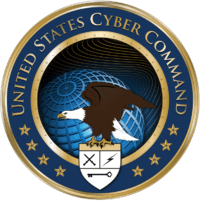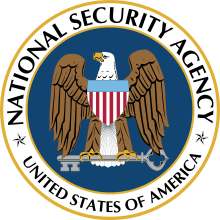Michael S. Rogers
| Mike Rogers | |
|---|---|
 | |
| Director of the National Security Agency | |
|
Assumed office April 3, 2014 | |
| President | Barack Obama |
| Deputy | Richard Ledgett |
| Preceded by | Keith Alexander |
| Commander of the United States Cyber Command | |
|
Assumed office April 3, 2014 | |
| President | Barack Obama |
| Preceded by | Keith Alexander |
| Personal details | |
| Born |
October 31, 1959 Chicago, Illinois, U.S. |
| Education |
Auburn University (BA) Naval War College (MS) |
| Military service | |
| Allegiance |
|
| Service/branch |
|
| Years of service | 1981–present |
| Rank |
|
| Commands |
U.S. Cyber Command National Security Agency U.S. Fleet Cyber Command U.S. Tenth Fleet |
| Battles/wars |
Invasion of Grenada Multinational Force in Lebanon |
Michael S. "Mike" Rogers (born October 31, 1959) is a United States Navy Admiral who serves as Director of the National Security Agency (NSA), Commander of the U.S. Cyber Command (USCYBERCOM) and Chief of the Central Security Service (CSS) since April 3, 2014. Prior to that, Rogers served as the commanding Admiral of the Tenth Fleet and Commander of the U.S. Fleet Cyber Command.[1][2]
Early life and education
Rogers is a native of Chicago, Illinois. He graduated from New Trier High School in 1977.[3] He is a graduate of Auburn University (1981) and the Naval War College.[4]
Career

1980s
Rogers received his commission through the Naval Reserve Officers Training Corps (NROTC) program and has served in the United States Navy since graduating from Auburn University in 1981. He started his career as a Surface Warfare Officer working in naval gunfire support operations off Grenada, Beirut, and maritime surveillance operations off El Salvador.[5] In 1986, he was selected for transfer from Unrestricted Line Officer to Restricted Line Officer and re-designation as a cryptology officer.[6]
2000s
During the 2003 U.S. invasion of Iraq, Rogers joined the military's Joint Staff, which works for the Joint Chiefs of Staff, where he specialized in computer network attacks. From 2007 onward he served as director of intelligence for the military's Pacific Command. In 2009, he became director of intelligence for the Joint Chiefs of Staff, and was subsequently named commander of U.S. Fleet Cyber Command and commander of the U.S. 10th Fleet, with responsibility for all of the Navy's cyberwarfare efforts.[5] As such, Rogers was the first restricted line officer to serve as a numbered fleet commander and the first Information Warfare Community (IWC) officer to achieve the rank of vice admiral.[7]
2010s
In January 2014, the Obama Administration announced Rogers' nomination as director of the National Security Agency and the commander of the US offensive cyberoperations unit in the Department of Defense. Rogers succeeded General Keith B. Alexander, who served as the NSA director for nine years,[8][9][10] and became the first IWC officer to achieve the rank of admiral. Although the NSA directorship does not require Senate approval, Rogers had to be confirmed by the Senate to head United States Cyber Command,[11] for which the Senate unanimously confirmed him.
In his first public remarks as NSA director, Rogers stated that he believed that NSA whistleblower Edward Snowden was "probably not" working for a foreign intelligence agency, despite frequent speculation and assertion by the NSA's allies to the contrary. Rogers added: "He clearly believes in what he's doing. I question that; I don't agree with it. I fundamentally disagree with what he did. I believe it was wrong; I believe it was illegal."[12]
The Washington Post reported on 19 November 2016 that Defense Secretary Ashton B. Carter and Director of National Intelligence (DNI) James R. Clapper Jr. had recommended to President Obama that Rogers be terminated as director of the National Security Agency. Carter reportedly recommended he be terminated due to poor performance, whereas Clapper considered it wise that the position be held by a civilian. Both Clapper and Carter had put Rogers on notice for poor performance in internal security and for a poor leadership style. His termination was reportedly delayed due to stalled changes to the bureaucratic structure of the intelligence community. Later, Rogers reportedly met with President-Elect Trump without notifying his supervisors in what is an unprecedented action for a military officer. Trump is reportedly considering replacing Clapper with Rogers as Director of National Intelligence (DNI).[13]
Military decorations
 |
Navy Information Dominance Warfare Officer Badge |
 |
Navy Surface Warfare Officer Badge |
 |
United States Cyber Command Badge |
 |
National Security Agency Badge |
| Navy Distinguished Service Medal | |
| Defense Superior Service Medal with two bronze oak leaf clusters | |
| Meritorious Service Medal with two gold award stars | |
| Joint Service Commendation Medal | |
| Navy Commendation Medal with award star | |
| Joint Meritorious Unit Award with three oak leaf clusters | |
| Navy Unit Commendation | |
| Navy Meritorious Unit Commendation with two bronze service stars | |
| Navy "E" Ribbon | |
| Navy Expeditionary Medal with two service stars | |
| National Defense Service Medal with service star | |
| Armed Forces Expeditionary Medal with service star | |
| Global War on Terrorism Expeditionary Medal | |
| Global War on Terrorism Service Medal | |
| Military Outstanding Volunteer Service Medal | |
| Navy Sea Service Deployment Ribbon with 2 service stars | |
| Navy & Marine Corps Overseas Service Ribbon with 4 service stars | |
| Navy Rifle Marksmanship Ribbon | |
| Navy Expert Pistol Shot Medal |
References
- ↑ "Navy cyber warfare chief is Obama's pick to lead NSA". Los Angeles Times. 27 January 2014. Retrieved 15 August 2015.
- ↑ https://fas.org/irp/congress/2014_hr/selva-rogers.pdf
- ↑ "New Trier's Rogers talks about U.S. Fleet Cyber Command". Chicago Sun-Times. Retrieved 26 January 2014.
- ↑ Peterson, Andrea (October 16, 2013). "Meet the man who could be next in line to control the NSA's spying apparatus". Retrieved March 13, 2014.
- 1 2 Sanger, David; Shanker, Thom (30 January 2014). "N.S.A. Choice Is Navy Expert on Cyberwar". The New York Times. Retrieved 30 January 2014.
- ↑ Guimont, Nathan L. (2 June 2012). "10th Fleet Commander Visits Navy Linguists". Navy.mil. U.S. Navy. Retrieved 3 August 2014.
- ↑ Nakashima, Ellen (25 January 2014). "Obama signs off on nomination of Rogers as NSA director". Washington Post. Retrieved 30 January 2014.
- ↑ Sanger, David (30 January 2014). "Vice Admiral to Be Named N.S.A. Director". New York Times. Retrieved 30 January 2014.
- ↑ Hattem, Julian (30 January 2014). "Obama to name new NSA director". The Hill. Retrieved 30 January 2014.
- ↑ Ackerman, Spencer (30 January 2014). "Vice-admiral Michael Rogers to take command of embattled NSA". The Guardian. Retrieved 31 January 2014.
- ↑ Ackerman, Spencer (3 June 2014). "NSA chief Michael Rogers: Edward Snowden 'probably not' a foreign spy". The Guardian. Retrieved 16 December 2015.
- ↑ "Pentagon and intelligence community chiefs have urged Obama to remove the head of the NSA". Washington Post. Retrieved 2016-11-19.
External links
 Media related to Michael S. Rogers at Wikimedia Commons
Media related to Michael S. Rogers at Wikimedia Commons
| Government offices | ||
|---|---|---|
| Preceded by Keith Alexander |
Director of the National Security Agency 2014–present |
Incumbent |
| Military offices | ||
| Preceded by Keith Alexander |
Commander of the United States Cyber Command 2014–present |
Incumbent |